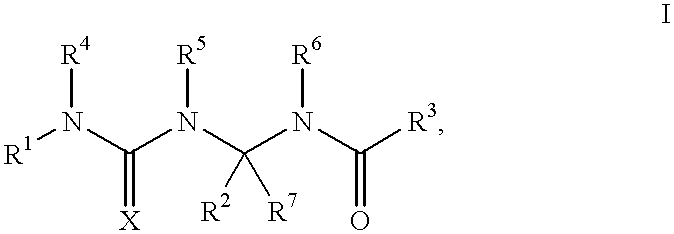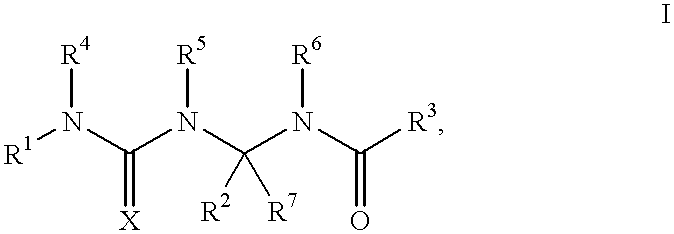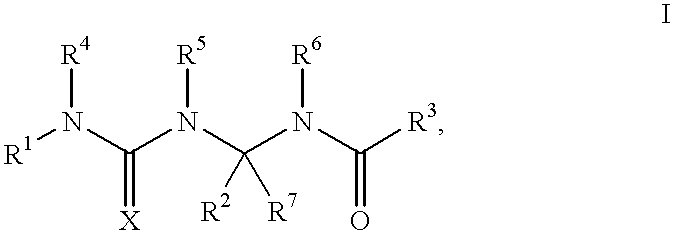Potassium channel openers
a technology of potassium channel and opener, which is applied in the direction of amide active ingredients, cardiovascular disorders, drug compositions, etc., can solve the problems of hyperpolarization of neuronal cells, excitability decline, excitability and neuronal cell death,
- Summary
- Abstract
- Description
- Claims
- Application Information
AI Technical Summary
Problems solved by technology
Method used
Image
Examples
example 1a
4-methyl-N-(2,2,2-trifluoro-1-hydroxyethyl)benzamide
A 500 mL round-bottom flask was charged with trifluoroacetaldehyde ethyl hemiacetal (12.3 g, 85.0 mmol), p-toluamide (10.0 g, 74.0 mmol), and dioxane (150 mL). The thick white slurry was stirred at ambient temperature for 3 hours, then heated at reflux for 44 hours. The homogeneous solution was cooled and concentrated in vacuo to provide a white solid. The crude material was dissolved in ethyl acetate (50 mL), adsorbed onto silica gel (50 g), and eluted through a medium porosity fritted filter funnel (elution with 25% ethyl acetate / hexanes, then ethyl acetate) to provide 14.1 g of the desired product as a white solid.
MS (APCI+) m / z 215 (M-H.sub.2 O).sup.+.
example 1b
N-(1-chloro-2,2,2-trifluoroethyl)-4-methylbenzamide
A stirred solution of Example 1A (3.48 g, 15.0 mmol) in CH.sub.2 Cl.sub.2 (60 mL) at 0.degree. C. was treated with pyridine (1.20 mL). The reaction mixture was treated dropwise with thionyl chloride (1.10 mL, 15.0 mmol), and the reaction flask was equipped with a calcium chloride drying tube. The reaction mixture was stirred at 0.degree. C. for 4 hours, the cooling bath was removed, and the solution was stirred at ambient temperature for an additional 12 hours. Concentration of the reaction mixture provided a white solid which was triturated with diethyl ether (2.times.200 mL) to provide 2.40 g of the desired product as a white solid.
MS (APCI+) m / z 252 (M+H).sup.+.
EXAMPLE 1C
4-methyl-N-(2,2,2-trifluoro-1-isothiocyanatoethyl)benzamide
A stirred solution of Example 1B (2.00 g, 8.00 mmol) in acetone (35 mL) at ambient temperature was treated with potassium thiocyanate (1.60 g, 16.0 mmol). The reaction mixture was stirred for 12 hours, co...
example 1d
4-methyl-N-(2,2,2-trifluoro-1-{[(3-pyridinylamino)carbothioyl]amino}ethyl)benzamide
A solution of 3-aminopyridine (145 mg, 1.54 mmol) in benzene (8 mL) at ambient temperature was treated with a solution of Example 1C (500 mg, 1.54 mmol) in benzene (1.5 mL). The reaction mixture was stirred for 1.5 hours, then concentrated to a nominal volume. The white solids which precipitated from solution were collected by filtration and were washed with diethyl ether. Recrystallization from 25% ethyl acetate / hexanes provided the desired product as a white solid.
mp 185-186.degree. C.;
MS (APCI+) m / z 369 (M+H).sup.+ ;
.sup.1 H NMR (DMSO-d.sub.6) .delta. 10.43 (s, 1H), 9.25 (d, 1H, J=8 Hz), 8.61 (dd, 1H, J=3, 1 Hz), 8.39-8.35 (m, 2H), 8.04-8.00 (m, 1H), 7.79 (m, 2H), 7.43-7.38 (m, 1H), 7.35-7.23 (m, 3H), 2.38 (s, 3H);
Anal. calcd for C.sub.16 H.sub.15 F.sub.3 N.sub.4 OS: C, 52.17; H, 4.10; N, 15.21. Found: C, 52.2; H, 3.96; N, 15.16.
PUM
| Property | Measurement | Unit |
|---|---|---|
| porosity | aaaaa | aaaaa |
| temperature | aaaaa | aaaaa |
| pH | aaaaa | aaaaa |
Abstract
Description
Claims
Application Information
 Login to View More
Login to View More - R&D
- Intellectual Property
- Life Sciences
- Materials
- Tech Scout
- Unparalleled Data Quality
- Higher Quality Content
- 60% Fewer Hallucinations
Browse by: Latest US Patents, China's latest patents, Technical Efficacy Thesaurus, Application Domain, Technology Topic, Popular Technical Reports.
© 2025 PatSnap. All rights reserved.Legal|Privacy policy|Modern Slavery Act Transparency Statement|Sitemap|About US| Contact US: help@patsnap.com



